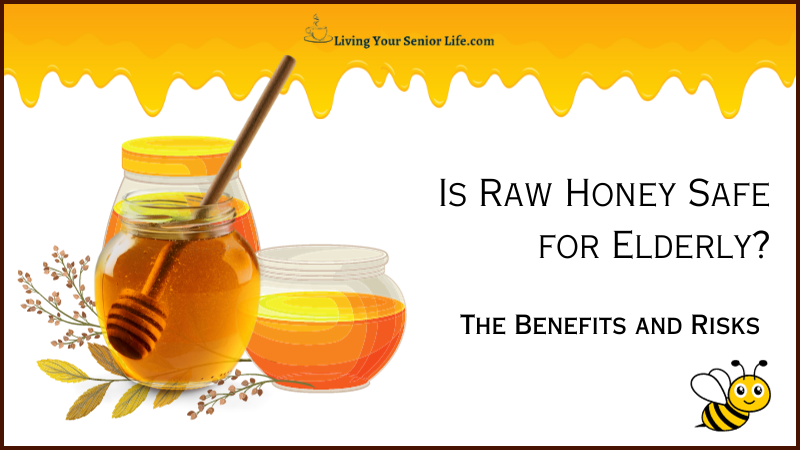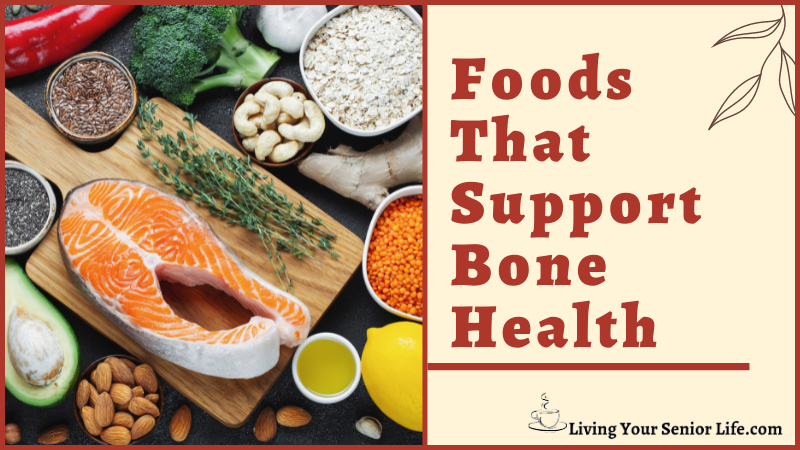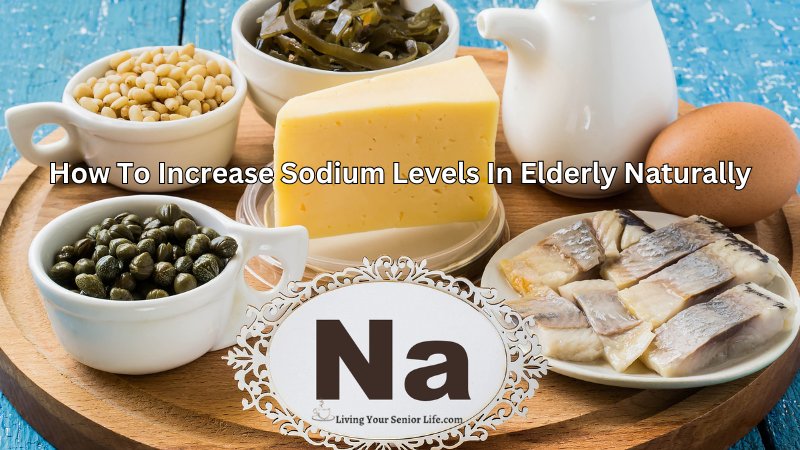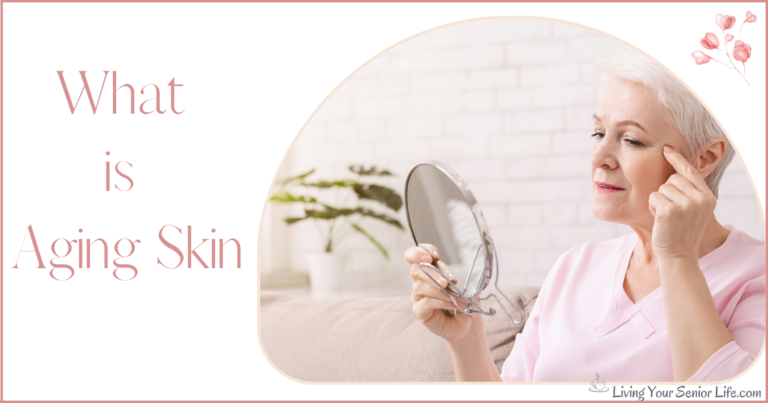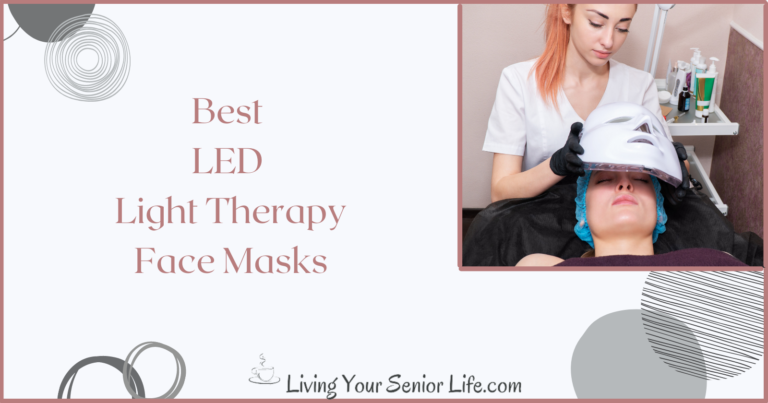Given the wide range of health benefits associated with raw honey, it’s natural for many older adults to wonder whether it’s a suitable addition to their diet. In this article, we delve into the question of whether Raw Honey is Safe for Elderly Consumption, uncovering the layers of this natural elixir that captivates with its sweetness and promises of well-being. But also when it comes to the health of seniors, it’s crucial to approach this exploration with caution and responsibility. While the appeal of raw honey is undeniable, it’s equally important to have a nuanced understanding of its safety and potential risks.
This post is for informational purposes only and should not be used in place of the advice of a medical professional.
Quick Answer: Is Raw Honey Safe For the Elderly? Yes, raw honey is generally considered safe for elderly individuals. It’s essential to understand that raw honey differs from regular honey commonly found in grocery stores due to the lack of a pasteurization process, meaning it retains more beneficial nutrients.
KeyTakeaways:
- Raw honey is rich in beneficial compounds, but it should be consumed with awareness of its effects on blood sugar and in moderation.
- Elderly individuals should consult with a healthcare provider before incorporating raw honey into their diet, especially if they have underlying health issues.
- Choosing the right type of honey, like manuka or local honey, can maximize health benefits while ensuring safety for elderly consumers.
What Is Raw Honey?
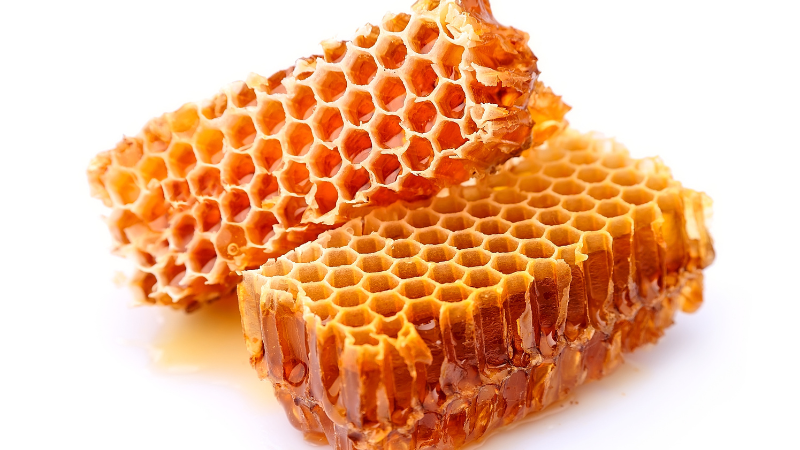
Raw honey is a natural sweetener that comes directly from the beehive, teeming with beneficial nutrients that distinguish it from its processed counterpart.
Definition and Extraction
Raw honey is the unprocessed, unheated, unpasteurized nectar collected by bees from flowers. This natural sweetener contains enzymes, bee pollen, and antioxidants, which are rich in nutritive value. Extraction involves removing honey from the honeycomb and directly bottling it, preserving all the natural enzymes and antioxidants.
Raw Honey vs Processed Honey
Processed honey, often found in grocery stores, has been heated, filtered, and pasteurized, which removes many beneficial properties. The pasteurization process involves high heat that can destroy beneficial enzymes and reduce antioxidant compounds. Raw honey retains its full array of flavor, color, and benefits, including antibacterial properties and hydrogen peroxide production, an enzymatic process that plays an important role in wound healing.
Video: Is Raw Honey Safe for Elderly Consumption?
Nutritional Profile of Raw Honey
Raw honey is more than just a natural sweetener; it’s a complex substance rich in nutrients that contribute to its health benefits. Here’s what you need to know about its nutritional makeup.
Vitamins and Minerals
Raw honey contains a range of vitamins and minerals that play an important role in your overall health. While it is not a significant source of these nutrients, it does contain trace amounts of B vitamins like niacin, riboflavin, and pantothenic acid. Minerals such as zinc and iron are also present, which are crucial for maintaining good health, especially in elderly people where deficiencies may be more common.
Antioxidants and Enzymes
A spoonful of honey packs a punch of antioxidants, which include phenolic acids and flavonoids. These compounds help neutralize free radicals, protecting the body from oxidative stress that can lead to chronic health conditions like heart disease. Moreover, enzymes such as glucose oxidase are found in raw honey, which, when combined with water, produces hydrogen peroxide, giving honey its antibacterial properties. These enzymes and antioxidants enhance the immune system and could potentially lower blood pressure and cholesterol levels, which is particularly beneficial as part of a balanced diet for the elderly.
Health Benefits of Raw Honey for the Elderly
Raw honey, which is honey as it exists in the beehive, has been championed for its potential health benefits, particularly for elderly people. A spoonful of honey not only offers a sweet treat but can also contribute positively to overall health.
Immune System Support
Raw honey is known to contain beneficial nutrients that play an important role in supporting the immune system. Manuka honey, a type of honey from New Zealand, is especially rich in antioxidant properties that help combat oxidative stress and free radicals. Regular consumption of a teaspoon of honey may help in reinforcing the body’s defenses against illnesses.
Anti-inflammatory Effects
The anti-inflammatory properties of raw honey can alleviate various ailments like a sore throat or inflammation related to seasonal allergies. Studies have suggested that amino acids and other compounds in honey contribute to these anti-inflammatory effects, which can be particularly beneficial for managing heart disease and blood pressure issues.
Antibacterial and Antifungal Properties
Raw honey’s antibacterial and antifungal properties are attributed to substances like hydrogen peroxide and bee propolis. These make it an excellent natural option for wound healing and fighting infections. Honey’s enzymatic process releases hydrogen peroxide, which can provide an antiseptic environment for minor wounds and sores common in older age groups.
Digestive Health
For digestive health, raw honey can be a boon. It fosters good bacteria in the gut and may provide relief from stomach ulcers caused by Helicobacter pylori. The prebiotic qualities of a tablespoon of honey can contribute to a balanced diet that maintains a healthy digestive system, often affected by aging.
Blood Sugar Management
While honey is a source of natural sugars, it’s essential for elderly people with diabetes or blood sugar management issues to consult their healthcare provider before incorporating it into their diet. For some, a modest amount of honey may serve as an alternative to white sugar, and recent studies have pointed out that it might offer a more gradual impact on blood sugar levels.
Incorporating raw honey into one’s diet should be done in moderation and as part of a balanced diet, especially for elderly individuals with specific health considerations.
Potential Risks and Considerations
While raw honey is praised for its health benefits, it’s important to consider the risks especially for elderly adults. Consulting a healthcare provider is advised before adding raw honey to your diet, particularly if you have concerns about allergies, botulism, and its effect on blood sugar levels.
Allergies and Pollen Content
Raw honey contains bee pollen, which can trigger allergic reactions in some individuals. Elderly people with seasonal allergies may experience increased allergy symptoms when consuming honey with high pollen content. It’s paramount to assess your susceptibility to bee pollen before including a spoonful of honey as part of your diet.
Botulism Risk
A significant health concern is the risk of botulism, caused by Clostridium botulinum spores found in some types of honey. While older children and adults generally have an immune system robust enough to protect against the toxin, elderly adults might be more vulnerable due to weakened immunity. Pure honey, including varieties like Manuka honey, might carry these spores, so the avoidance of raw honey is often recommended for improved overall health and safety.
Effect on Blood Sugar and Diabetes
Although honey is a natural sweetener and can be a better option than white sugar, it still affects blood sugar levels. For those managing diabetes or pre-diabetes, the natural sugars in honey can cause blood sugar spikes. Continual monitoring of blood sugar levels is necessary when consuming honey, and discussing with a healthcare provider for the best results in managing your condition is essential.
Usage Tips for Elderly Consumers
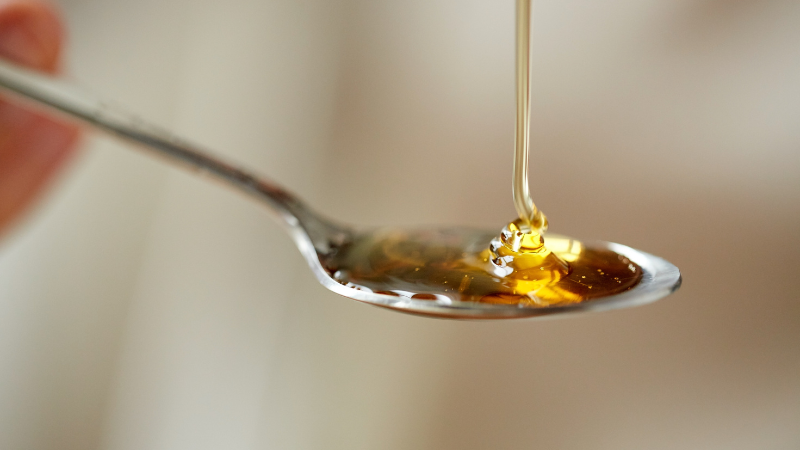
Raw honey is a versatile natural sweetener with benefits for elderly individuals, such as helping with coughs and digestion, and it can also be applied topically for skin-related issues. Here are some practical ways to safely incorporate raw honey into your routine.
Incorporating Raw Honey Into the Diet
- Natural Sweetener: Swap out white sugar for a teaspoon of honey in your tea or yogurt to enjoy its natural sugars and beneficial nutrients.
- Digestive Aid: Consuming a spoonful of honey may aid in alleviating constipation and supporting overall digestion.
- Cough Remedy: A small amount of raw honey can act as a natural cough suppressant. It is suggested to take one or two teaspoons before bedtime to help control coughs.
- Antioxidant Boost: Including honey can combat oxidative stress by providing antioxidant compounds that neutralize free radicals.
Topical Application for Skin and Wound Care
- Wound Healing: Apply a thin layer of honey to minor burns or wounds to utilize its antiseptic properties and promote healing.
- Skin Care: For treating minor skin irritations, raw honey’s anti-inflammatory effects can soothe the skin.
Choosing the Right Raw Honey
- Local Honey: Opt for local raw honey or organic honey to ensure you are getting high-quality products without high heat treatment that can destroy beneficial enzymes.
- Type of Honey: Specific varieties such as Manuka honey, have strong antibacterial properties known to aid in wound care and may also target helicobacter pylori involved in stomach ulcers.
- Label Check: Ensure the honey is truly raw by checking for terms like “pure honey”, “unfiltered honey”, or “organic honey”. Avoid honey labeled as “commercial honey” or “regular honey”, which may have undergone pasteurization process and lost many health benefits.
Raw Honey and Chronic Conditions
In managing chronic conditions, the natural composition of raw honey can play a supportive role, particularly due to its antioxidant and anti-inflammatory properties. This section delves into how raw honey affects heart, brain, and respiratory health.
Honey and Heart Health
Regular honey, especially the darker varieties like manuka honey, contains beneficial nutrients that have been linked to heart health. With a spoonful of honey, you’re ingesting antioxidants that fight oxidative stress and may help prevent heart attacks and strokes. Honey’s antioxidant properties can also contribute to maintaining healthy cholesterol levels, a significant factor in preventing heart disease. Furthermore, raw honey’s impact on blood pressure and blood sugar levels distinguishes it from high fructose corn syrup and white sugar, making it a smarter choice as a natural sweetener.
Neuroprotective Properties
Neurotransmitter acetylcholine is crucial for learning and attention, with cholinesterase inhibitors playing a vital role in managing Alzheimer’s and memory impairment. Raw honey, packed with antioxidants like phenolic acids, is thought to have a beneficial effect on brain health. These antioxidant compounds protect your brain from cell damage due to free radicals, suggesting a neuroprotective effect that supports overall health, including cognitive functions.
Raw Honey and Respiratory Health
For those with chronic respiratory infections and seasonal allergies, a teaspoon of honey, particularly local honey, can act as a natural cough suppressant with its antimicrobial and antiseptic properties. Honey consumption, especially manuka or organic honey, can offer a significant reduction in cough and allergy symptoms, particularly during allergy season. Additionally, honey promotes the good bacteria that can benefit your immune system’s response to chronic infections.
Sustainable Practices and Ethical Considerations
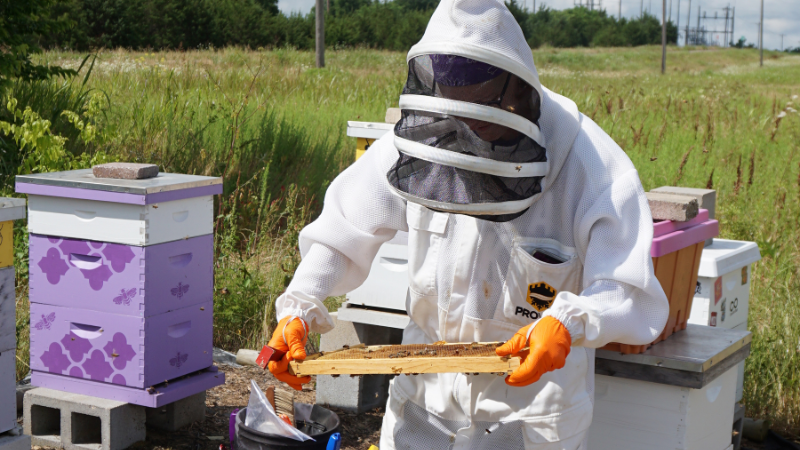
When you consider incorporating raw honey into an elderly person’s diet for its health benefits, understanding the source and the way it is produced is crucial. Sustainable beekeeping plays an important role not only in the welfare of honeybees but also in the environment. It can help reduce the environmental impact and mitigate climate change.
Locally sourced raw honey supports sustainable practices, as local beekeepers often ensure minimal processing and humane treatment of the bees. Choosing local raw honey can also lower the carbon footprint associated with transportation.
- Organic honey is also a consideration. Organic beekeeping prohibits the use of harmful chemicals that can affect the bees, the quality of the honey, and the surrounding environment.
- Bee pollen and bee propolis are substances collected and used by bees with numerous health benefits, often found in purer forms within organic raw honey.
When you purchase honey, opting for ethical brands can contribute to supporting habitats for bees and other pollinating insects, which are essential against climate change. Ethical consideration also extends to supporting fair trade practices which improve the livelihood of beekeepers.
Seasonal allergies may be alleviated by regular consumption of honey produced from your local environment, as it contains pollen that may arm the immune system to these allergens. It’s not only a matter of wellbeing; responsible honey consumption reflects your support for protecting bee colonies, which are vital players in pollination and biodiversity.
Before indulging in a spoonful of honey, consider its origin. Responsible choices can contribute to your overall health and the planet’s wellbeing. Remember, sustainable and ethical purchasing can benefit not just you but also the hardworking honeybees.
Frequently Asked Questions
In this section, we’ll explore some common inquiries regarding the consumption of raw honey by elderly individuals, addressing nutritional values, recommended dosages, and the impact on inflammatory conditions.
How does raw honey differ from pure honey in terms of nutritional value and safety?
Raw honey is unfiltered honey straight from the honeycombs, with all its natural nutrients intact, such as bee pollen, antioxidants, and enzymes like glucose oxidase. This type of honey contains more beneficial nutrients than regular honey, which undergoes a pasteurization process that can diminish its natural qualities. In terms of safety, both types of honey are generally safe for elderly people, but raw honey’s higher antibacterial properties can be particularly beneficial, as it fosters good bacteria in the gut.
What is the recommended amount of raw honey for elderly people to consume daily?
While there’s no one-size-fits-all answer, a common suggestion for elderly people is to consume no more than a spoonful of honey a day. This moderate intake ensures they can reap the health benefits of raw honey such as a significant reduction in sore throat symptoms or digestive improvements without adversely affecting blood sugar levels. Always consult with a healthcare provider for personalized advice.
How can raw honey potentially affect inflammatory conditions in the aging population?
Raw honey has substantial anti-inflammatory properties that may benefit elderly people dealing with inflammatory conditions, thanks to its antioxidant compounds which help neutralize free radicals and reduce oxidative stress. Recent studies have indicated that a regular intake of raw honey can lead to a significant improvement in chronic infections and may also support overall heart health by aiding in the management of blood pressure and cholesterol levels.
Additional Reading
Conclusion
As we wrap up our exploration into the safety of raw honey for the elderly, it’s evident that nature’s golden elixir holds both allure and caution. Raw honey, with its myriad health benefits, is a tempting addition to any diet, yet its safety for seniors requires a nuanced understanding.
In our journey through the nectar-rich landscapes, we’ve uncovered the potential wonders of raw honey—its antibacterial properties, immune-boosting capabilities, and delightful taste that sweetens life’s moments. However, as stewards of senior well-being, we must tread carefully.
Remember, moderation is the key. While raw honey can offer a natural alternative to refined sugars and potential health perks, it’s crucial to consider individual health conditions, allergies, and medications. Always consult with a healthcare professional before introducing any significant dietary changes.
Our quest for knowledge doesn’t end here; it merely transforms into an ongoing dialogue. Share your experiences, insights, and questions in the comments below. Let’s foster a community where wisdom flows as freely as honey from the comb.
As you navigate the ever-evolving landscape of senior wellness, refer back to our comprehensive guide whenever questions arise. Stay curious, stay informed, and, most importantly, stay connected to the sweetness of life.
Thank you for being part of the Living Your Senior Life community, where we unravel the mysteries of aging with grace, wisdom, and a touch of sweetness.
Until next time, embrace the journey and savor the sweetness!
What are your thoughts on the benefits of raw honey? Please comment below.
